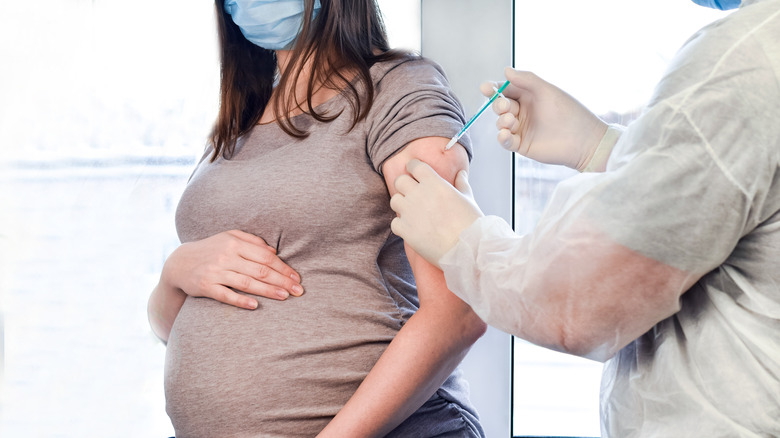What This COVID-19 Vaccination Side Effect Means For Women
There has been a lot of misinformation spread about COVID-19 vaccinations in recent months. While it's normal to be concerned about potential side effects, it is important to get your information from medical professionals. Many side effects from the COVID-19 vaccine are mild and temporary. It is also normal to learn about new side effects for this vaccine, as it is new and still being studied.
A recent study published in Obstetrics & Gynecology found that many women experience a one-day increase in their menstrual cycle following their vaccine administration. However, the change is usually temporary and resolves itself within a few months. It is also important to note that experts do not believe women should be concerned about this effect. "The bottom line is, we really think these findings are reassuring for health and reproductive health," Dr. Alison Edelman, an OB/GYN and professor at the Oregon Health & Science University, Portland and the study's lead researcher, told CNN. The study also noted that changes in menstrual cycles can be affected by many factors, including sleep, stress, and overall health.
Does the COVID-19 vaccine affect fertility?
Data has repeatedly shown that the COVID-19 vaccine does not affect fertility. The American College of Obstetricians and Gynecologists states that "Leading medical organizations have repeatedly affirmed that the COVID-19 vaccines have no impact on fertility." According to the CDC, the COVID-19 vaccine is "recommended for people who are pregnant, breastfeeding, trying to get pregnant now, or might become pregnant in the future." The CDC also notes that there is currently no evidence that any vaccine, including the COVID-19 vaccine, causes fertility issues in men or women.
In fact, COVID-19 itself has been shown to cause issues with fertility. According to the CDC, "Although the overall risks are low, people who are pregnant or recently pregnant are at an increased risk for severe illness from COVID-19 when compared to people who are not pregnant. People who have COVID-19 during pregnancy are also at increased risk for preterm birth (delivering the baby earlier than 37 weeks) and stillbirth and might be at increased risk for other pregnancy complications." If you are pregnant or thinking about getting pregnant, the best way to protect yourself from COVID-19 is to get vaccinated.


